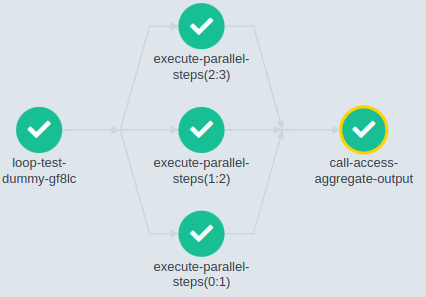Loops¶
When writing workflows, it is often very useful to be able to iterate over a set of inputs, as this is how argo-workflows can perform loops.
There are three basic ways of running a template multiple times.
withSequenceiterates over a sequence of numbers.withItemstakes a list of things to work on. Either- plain, single values, which are then usable in your template as '{{item}}'
- a JSON object where each element in the object can be addressed by it's key as '{{item.key}}'
withParamtakes a JSON array of items, and iterates over it - again the items can be objects like withwithItems. This is very powerful, as you can generate the JSON in another step in your workflow, so creating a dynamic workflow.
withSequence example¶
This runs a template multiple times using withSequence.
apiVersion: argoproj.io/v1alpha1
kind: Workflow
metadata:
generateName: loop-sequence-
spec:
entrypoint: loop-sequence-example
templates:
- name: loop-sequence-example
steps:
- - name: hello-world-x5
template: hello-world
withSequence:
count: "5"
- name: hello-world
container:
image: docker/whalesay:latest
command: [cowsay]
args: ["hello world!"]
withItems basic example¶
This iterates over a list of items with withItems, substituting a string for each instantiated template.
apiVersion: argoproj.io/v1alpha1
kind: Workflow
metadata:
generateName: loops-
spec:
entrypoint: loop-example
templates:
- name: loop-example
steps:
- - name: print-message
template: whalesay
arguments:
parameters:
- name: message
value: "{{item}}"
withItems: # invoke whalesay once for each item in parallel
- hello world # item 1
- goodbye world # item 2
- name: whalesay
inputs:
parameters:
- name: message
container:
image: docker/whalesay:latest
command: [cowsay]
args: ["{{inputs.parameters.message}}"]
withItems more complex example¶
If we'd like to pass more than one piece of information in each workflow, you can instead use a JSON object for each entry in withItems and then address the elements by key, as shown in this example.
apiVersion: argoproj.io/v1alpha1
kind: Workflow
metadata:
generateName: loops-maps-
spec:
entrypoint: loop-map-example
templates:
- name: loop-map-example # parameter specifies the list to iterate over
steps:
- - name: test-linux
template: cat-os-release
arguments:
parameters:
- name: image
value: "{{item.image}}"
- name: tag
value: "{{item.tag}}"
withItems:
- { image: 'debian', tag: '9.1' } #item set 1
- { image: 'debian', tag: '8.9' } #item set 2
- { image: 'alpine', tag: '3.6' } #item set 3
- { image: 'ubuntu', tag: '17.10' } #item set 4
- name: cat-os-release
inputs:
parameters:
- name: image
- name: tag
container:
image: "{{inputs.parameters.image}}:{{inputs.parameters.tag}}"
command: [cat]
args: [/etc/os-release]
withParam example¶
This example does exactly the same job as the previous example, but using withParam to pass the information as a JSON array argument, instead of hard-coding it into the template.
apiVersion: argoproj.io/v1alpha1
kind: Workflow
metadata:
generateName: loops-param-arg-
spec:
entrypoint: loop-param-arg-example
arguments:
parameters:
- name: os-list # a list of items
value: |
[
{ "image": "debian", "tag": "9.1" },
{ "image": "debian", "tag": "8.9" },
{ "image": "alpine", "tag": "3.6" },
{ "image": "ubuntu", "tag": "17.10" }
]
templates:
- name: loop-param-arg-example
inputs:
parameters:
- name: os-list
steps:
- - name: test-linux
template: cat-os-release
arguments:
parameters:
- name: image
value: "{{item.image}}"
- name: tag
value: "{{item.tag}}"
withParam: "{{inputs.parameters.os-list}}" # parameter specifies the list to iterate over
# This template is the same as in the previous example
- name: cat-os-release
inputs:
parameters:
- name: image
- name: tag
container:
image: "{{inputs.parameters.image}}:{{inputs.parameters.tag}}"
command: [cat]
args: [/etc/os-release]
withParam example from another step in the workflow¶
Finally, the most powerful form of this is to generate that JSON array of objects dynamically in one step, and then pass it to the next step so that the number and values used in the second step are only calculated at runtime.
apiVersion: argoproj.io/v1alpha1
kind: Workflow
metadata:
generateName: loops-param-result-
spec:
entrypoint: loop-param-result-example
templates:
- name: loop-param-result-example
steps:
- - name: generate
template: gen-number-list
# Iterate over the list of numbers generated by the generate step above
- - name: sleep
template: sleep-n-sec
arguments:
parameters:
- name: seconds
value: "{{item}}"
withParam: "{{steps.generate.outputs.result}}"
# Generate a list of numbers in JSON format
- name: gen-number-list
script:
image: python:alpine3.6
command: [python]
source: |
import json
import sys
json.dump([i for i in range(20, 31)], sys.stdout)
- name: sleep-n-sec
inputs:
parameters:
- name: seconds
container:
image: alpine:latest
command: [sh, -c]
args: ["echo sleeping for {{inputs.parameters.seconds}} seconds; sleep {{inputs.parameters.seconds}}; echo done"]
Accessing the aggregate results of a loop¶
The output of all iterations can be accessed as a JSON array, once the loop is done. The example below shows how you can read it.
Please note: the output of each iteration must be a valid JSON.
apiVersion: argoproj.io/v1alpha1
kind: WorkflowTemplate
metadata:
name: loop-test
spec:
entrypoint: main
templates:
- name: main
steps:
- - name: execute-parallel-steps
template: print-json-entry
arguments:
parameters:
- name: index
value: '{{item}}'
withParam: '[1, 2, 3]'
- - name: call-access-aggregate-output
template: access-aggregate-output
arguments:
parameters:
- name: aggregate-results
# If the value of each loop iteration isn't a valid JSON,
# you get a JSON parse error:
value: '{{steps.execute-parallel-steps.outputs.result}}'
- name: print-json-entry
inputs:
parameters:
- name: index
# The output must be a valid JSON
script:
image: alpine:latest
command: [sh]
source: |
cat <<EOF
{
"input": "{{inputs.parameters.index}}",
"transformed-input": "{{inputs.parameters.index}}.jpeg"
}
EOF
- name: access-aggregate-output
inputs:
parameters:
- name: aggregate-results
value: 'no-value'
script:
image: alpine:latest
command: [sh]
source: |
echo 'inputs.parameters.aggregate-results: "{{inputs.parameters.aggregate-results}}"'

The last step of the workflow above should have this output:
inputs.parameters.aggregate-results: "[{"input":"1","transformed-input":"1.jpeg"},{"input":"2","transformed-input":"2.jpeg"},{"input":"3","transformed-input":"3.jpeg"}]"